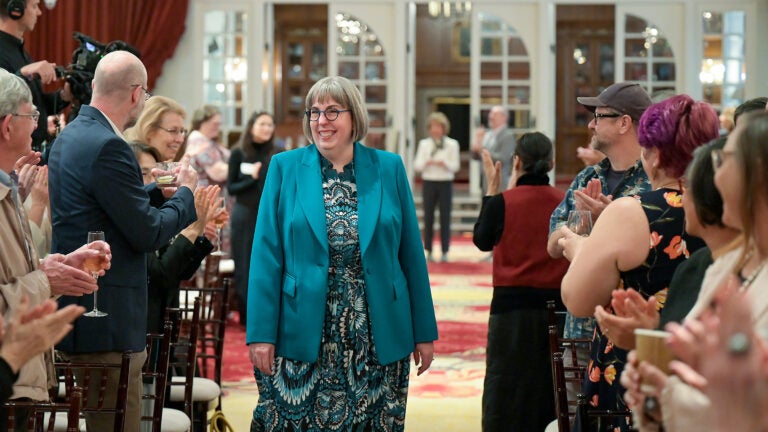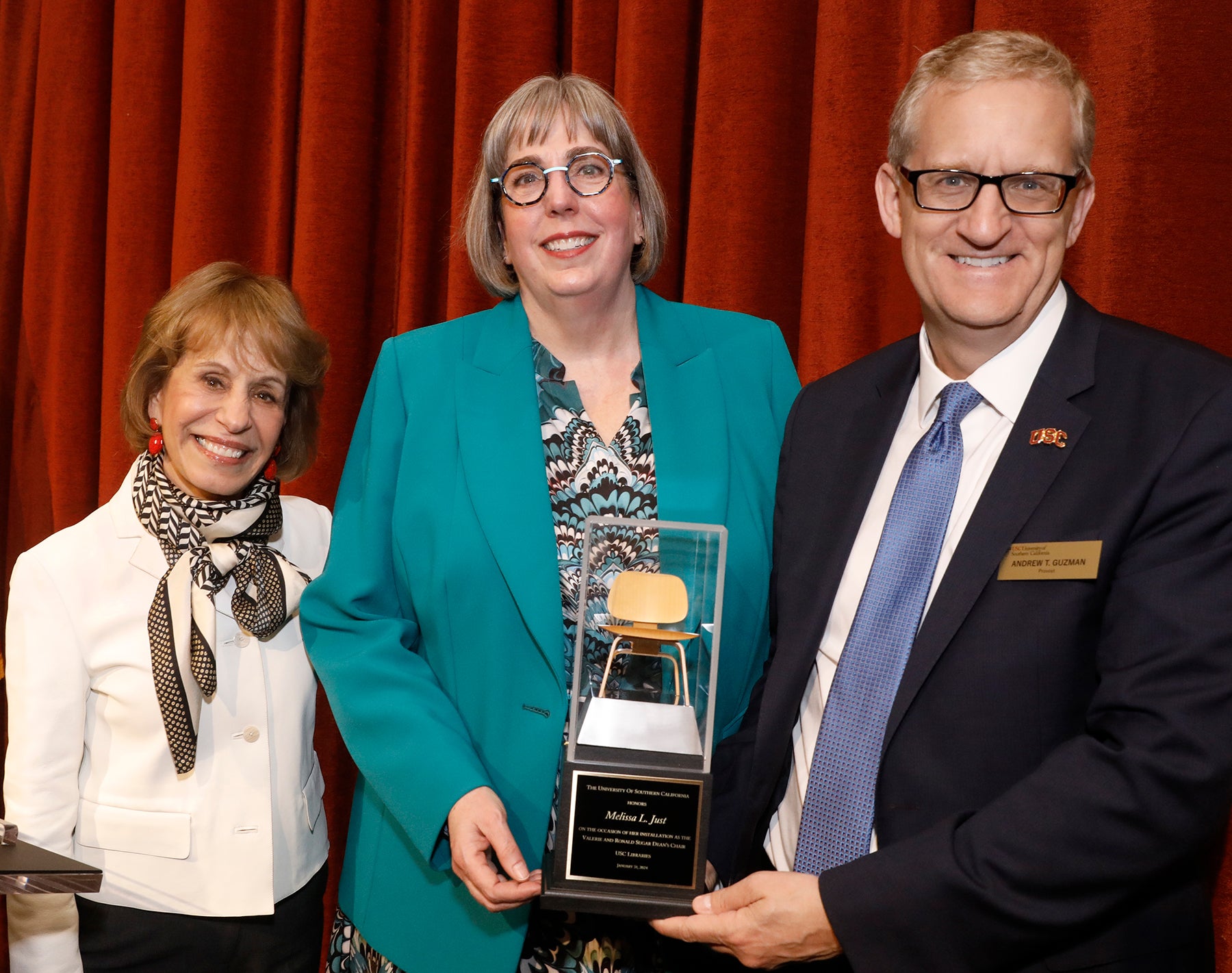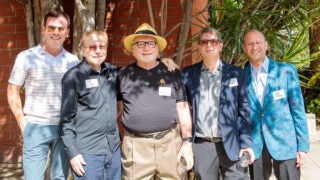
Melissa Just gets a warm welcome as she enters her installation ceremony as dean of USC Libraries on Wednesday afternoon. (USC Photo/Gus Ruelas)
New USC Libraries dean receives official Trojan welcome at installation ceremony
USC alumna Melissa Just joins the university after more than six years as library dean at the University of Saskatchewan.
In a crowded banquet hall on USC’s University Park Campus on Wednesday afternoon, Melissa Just was officially installed as the Valerie and Ronald Sugar Dean’s Chair of the USC Libraries. The longtime library professional spent the previous 6 1/2 years as library dean at the University of Saskatchewan in Saskatoon, Canada, with a library system that served 26,000 students and 1,000 faculty members across 17 colleges, schools and professional programs.
“I’m honored to rejoin USC in this pivotal time in our university’s history, with the launch and early stages of our ‘moonshots’ and the important work we’re undertaking through our USC Culture Journey,” Just said.
The event was a homecoming for Just, both as a Southern California native and as a USC alumna. Just received her Doctor of Education degree from the USC Rossier School of Education in 2007. As a librarian with roughly 30 years in the profession, Just also started her career at USC’s Norris Medical Library. From there her career took her across the country and internationally before this Trojan ended up back home as USC’s new dean of libraries.
“The library is the heart of any great university — they are the lifeblood of the educational mission and even though they change in form, they don’t really change in intent and the need for them,” USC President Carol Folt said. “Dr. Melissa Just is the right person to lead us through the challenges of the day and to help us truly capitalize and build on the amazing opportunities ahead.”
USC Libraries dean: Coming full circle
Just credited USC with sparking her initial interest in a career in libraries. After working at the USC Norris Medical Library, she began splitting her time at Children’s Hospital Los Angeles, before accepting a position at the University of California, San Diego, then Rutgers University in New Jersey, and eventually the University of Saskatchewan.

“I found little ways to carry parts of USC and of Los Angeles with me as I moved from here to San Diego to New Jersey, and then on to Saskatchewan,” Just said. “But there really is no substitute for the real thing.”
Just said she’s excited to rejoin USC during a time of Folt’s “moonshots.” One — USC Competes, which aims to make USC the top destination for mission-driven students, faculty and staff from all backgrounds — resonated with her the most.
“It speaks to my own story and to my pathway into libraries, and everything they made possible for me,” she said.
As the first member of her family to attend college, Just said she had no idea how to navigate university life or what to expect. Her freshman year, she took a work-study position in the library, where she said the staff mentored her and showed her what doors the library could open.
“Their knowledge became my knowledge, and I took — without even realizing it — little steps that led me to library school, to my position at USC Norris Medical Library, the positions that followed and where I stand today as the newly installed dean of USC’s exceptional library system,” she said.
A wealth of knowledge
One could assume that anyone working in a library is an avid reader. But there are avid readers, and then there is Melissa Just.
Just said that she reads around 120 books per year, and that she keeps lists of all of them — a fitting pastime for someone taking over a system of 22 libraries and over 5 million titles. Just said she was drawn back to USC not only due to the resources of the university and its libraries, but also the engagement level with the campus community.
“Our USC Digital Library alone is home to more than 1.5 million items, including historic photographs, video and sound recordings, rare books and high-resolution images of the Dead Sea Scrolls and tablets from Egypt, Sumer and other cultures,” Just said. “We’re actively building this digital collection to bring that documentary heritage to life and to expand its reach beyond the confines of our physical spaces.”
The road ahead for USC Libraries dean
As Just addressed a crowd of academics and university and library professionals, she pointed out how the mission of academic libraries is relevant to many key issues facing the world today.
“There’s enormous potential for library spaces to more deeply draw in, engage and support collaborative learning and creation for our entire campus community while also helping people find common ground with each other,” Just said.
She also noted that libraries can use controversial tools like artificial intelligence to educate and cultivate a culture of understanding.
“We further enrich access to information by applying approaches from artificial intelligence to enhance how people engage with the cultural collections that are in our care,” she said. “We’re refining how to use these tools ethically to aid in the greater understanding of the past.”
In order to make knowledge as open as possible, Just knows that a collaborative effort is needed. Luckily, she said, that spirit of cooperation is already in place at USC.
“Our libraries at USC are working closely and collaboratively with faculty and students to shape a brighter future, and in this shared future, the world of possibilities we are creating for the people who will come after us is growing even brighter thanks to the research and the teaching of our faculty,” Just said. “By championing open access, we’re extending the reach and visibility of the critical research underway here at USC, while also expanding the availability of knowledge to non-academic researchers, community members and places around the globe where access to information is limited by economic, social and political barriers. We do this work because it supports a just and equitable future and access to information.”



